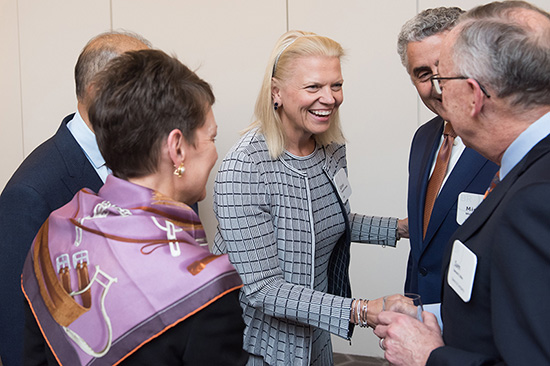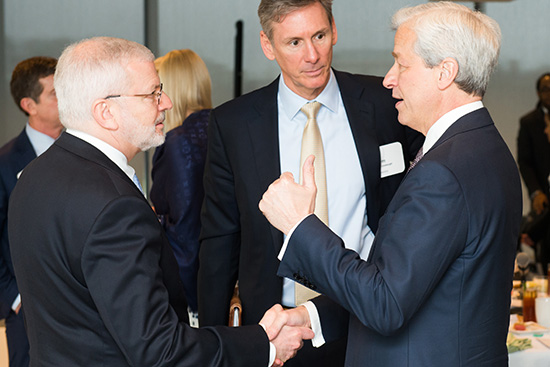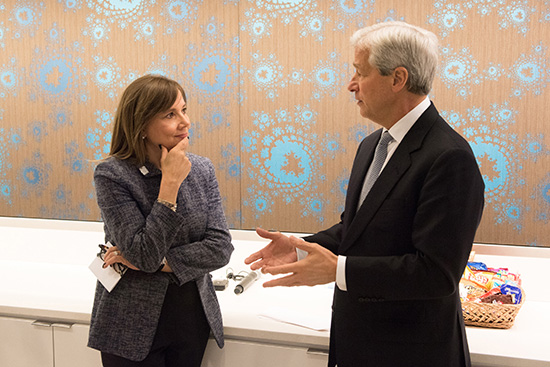|
对米尔顿·弗里德曼来说,这很简单。“企业有且只有一种社会责任。”这位诺贝尔经济学奖得主在1970年写道:“那就是从事旨在提高企业利润的活动。”企业当然必须遵守法律。但除此之外,它们的本职工作就是为股东赚钱。 弗里德曼的观点占了上风,至少在美国是这样。在接下来的几十年里,“股东至上”俨然成为了传统的商业智慧。1997年,颇具影响力的商业圆桌会议(Business Roundtable,下文简称BRT),一个由近200家美国最著名公司的首席执行官组成的协会,在一份正式的企业使命宣言中庄严阐述了这一理念。该组织宣称:“管理层和董事会的首要职责是对企业股东负责,其他利益相关者的利益是企业对股东责任的派生物。” 时代变了。 8月19日,BRT发布了一份新的公司使命宣言,并将旧目标扔到垃圾桶里。这份新声明长300字,直到250字才提到股东。在此之前,该组织强调要“为客户创造价值”、“投资于员工”、促进“多样性和包容性”、“公平且合乎道德地与供应商打交道”、“支持我们工作的社区”,以及“保护环境”。 弗里德曼地下有知,恐怕不得安宁。 这份新声明是为期一年重新审视的结果,它始于一场让人如坐针毡的晚宴。一群新闻批评家对出席晚宴的首席执行官、学者、非政府组织和政治领导人进行了一项全面的调查。“这是一段旅程。”主持这项工作的强生公司的首席执行官亚历克斯·戈尔斯基如是说道。但它是一段非常必要的旅程,因为“人们问到了一些根本性问题,我们必须反思资本主义究竟在多大程度上服务于社会。” BRT主席,摩根大通的首席执行官杰米·戴蒙表示,这份声明“承认企业可以为普通美国人提供更多帮助。” |
For Milton Friedman, it was simple. “There is one and only one social responsibility of business,” the Nobel economist wrote in 1970: to “engage in activities designed to increase its profits.” Companies must obey the law. But beyond that, their job is to make money for shareholders. And Friedman’s view prevailed, at least in the United States. Over the following decades, “shareholder primacy” became conventional business wisdom. In 1997, the influential Business Roundtable (BRT), an association of the chief executive officers of nearly 200 of America’s most prominent companies, enshrined the philosophy in a formal statement of corporate purpose. “The paramount duty of management and of boards of directors is to the corporation’s stockholders,” the group declared. “The interests of other stakeholders are relevant as a derivative of the duty to stockholders.” Times change. On Aug. 19, the BRT announced a new purpose for the corporation and tossed the old one into the dustbin. The new statement is 300 words long, and shareholders aren’t mentioned until word 250. Before that, the group refers to creating “value for customers,” “investing in employees,” fostering “diversity and inclusion,” “dealing fairly and ethically with suppliers,” “supporting the communities in which we work,” and “protect[ing] the environment.” Friedman must be turning in his grave. The new statement is the result of a yearlong reexamination that began with a testy dinner attended by a group of journalistic critics and involving a comprehensive survey of CEOs, academics, NGOs, and political leaders. “It has been a journey,” says Johnson & Johnson CEO Alex Gorsky, who chaired the effort. But it was a necessary journey because “people are asking fundamental questions about how well capitalism is serving society.” JPMorgan Chase CEO Jamie Dimon, who chairs the Roundtable, said the statement “is an acknowledgment that business can do more to help the average American.” |
****
|
四十年来,我一直在报道商业新闻。在此期间,我对美国和全球最大公司的首席执行官进行了数百次采访。在过去的几年里,我清楚地看到,他们对待自身工作的方式发生了根本而深刻的变化。 如果你要追溯这一变化的历史,它或许发轫自比尔·盖茨2008年在达沃斯发表的那篇演讲。2008年是盖茨在微软全职工作的最后一年。他在世界经济论坛上呼吁建立一种新的“创造性资本主义”。他说,“资本主义的神奇之处”在于它能够“以一种有益且可持续的方式利用人类的自利倾向。”但它的好处不可避免地偏向于那些有能力支付的人。“要想迅速地改善穷人的境遇,我们需要建立一个以更好的方式吸引创新者和企业的体系。这个体系将背负双重使命:创造利润,并帮助那些未能完全受益于市场力量的人改善境遇。” 在接下来的几年里,哈佛商学院的教授迈克尔·波特开始推广他所称的“共享价值”资本主义,全食超市的联合创始人约翰·麦基提出“有意识的资本主义”。Salesforce的首席执行官马克·贝尼奥夫撰写了一本关于“富有同情心的资本主义”的著作;家族投资公司EL·罗斯柴尔德的首席执行官林恩·福斯特·德·罗斯柴尔德开始动员“包容性资本主义”;为自由企业鼓与呼的研究机构世界大企业联合会呼吁追寻“可持续性资本主义”。 资本主义似乎迫切需要一个修饰语。 促使这种语法上自我反省的,是一场全球金融风暴。2000年代末的金融危机动摇了市场经济的根基,酿成了一些更为可怕的后果:超级富豪与有工作的穷人之间,充足的资本回报与停滞不前的工资之间,受保护的少数人和脆弱的大多数人之间,显现出一道巨大且不断扩大的鸿沟。此外,一系列颠覆性商业技术的横空出世,进一步加剧了这些不平等。从数字化到机器人,再到人工智能,这些在金融危机后逐渐成熟的技术,让弱势工人更加体会到社会的不公。 “反体制”情绪广泛存在,其规模之大令人震惊,尤其是在年轻人当中。2016年哈佛大学的一项研究发现,51%的18岁至29岁美国受访者不支持资本主义;与此同时,三分之一的人赞成转向社会主义。2018年的一项盖洛普民调也发现了类似的结果——只有45%的人对资本主义持正面看法,比2010年下降了23个百分点,而2010年美国人还处在大衰退的阴影中。其他民调显示,甚至有相当一部分共和党人突然对自由市场持谨慎态度。 在2016年英国脱欧公投中,英国民众蔑视企业和政治领导人的集体共识,选择离开欧盟,对现行体制的排斥由此可见一斑。这一点也在异常惨烈的美国总统大选中体现得淋漓尽致。选情领先的共和党人唐纳德·特朗普猛烈抨击全球化和自由贸易(即使美国在过去75年的经济增长正是拜全球化和自由贸易所赐),而民主党人也几乎把社会主义者伯尼·桑德斯推举为他们的总统候选人。 资本主义,至少是大型跨国公司所奉行的那种资本主义,正在受到来自于各方的攻击,首席执行官们听到了这一响亮而清晰的讯息。 那年12月,在教皇方济各的鼓励下,《财富》杂志召集大约100位大公司的首席执行官共聚罗马,就私营部门如何应对全球社会问题展开深入探讨。好事达保险、巴克莱银行、陶氏化学、IBM、强生、西门子等公司的掌门人提出一系列措施,以期帮助全球数十亿缺乏基本金融服务的人获得服务,支持应对气候变化的努力,为那些工作受到技术变革威胁的人扩大培训项目,并为无法享受医疗服务的5亿人提供基本的社区卫生服务。 这次聚会的目的——以一种非常不像米尔顿·弗里德曼的方式——不是最大化股东价值,而是最大化社会效益。许多首席执行官似乎真心希望利用他们的商业平台推动变革。但正如我在私下讨论中反复听到的那样,这次谈话的背景始终萦绕在人们的脑海中,今天依然如此:越来越多的首席执行官担心,公众对他们运营其间的资本主义体系的支持有可能消失殆尽。 “社会给了我们每个人一张经营许可证。”IBM的首席执行官罗睿兰在今年8月告诉我。“这是一个社会是否信任你的问题。我们需要社会接受我们的所作所为。” |
I’ve covered business as a journalist for four decades and, over that time, have conducted hundreds of interviews with CEOs of the largest corporations in the U.S. and across the globe. In the past few years, it has become clear to me that something fundamental and profound has changed in the way they approach their jobs. If you were to trace the history of that change, you might start with the speech Bill Gates gave in Davos in 2008, in his last year of full-time service at Microsoft, calling for a new “creative capitalism.” As Gates told the World Economic Forum, “the genius of capitalism” lies in its ability to “[harness] self-interest in helpful and sustainable ways.” But its benefits inevitably skew to those who can pay. “To provide rapid improvement for the poor,” he said, “we need a system that draws in innovators and businesses in a far better way … Such a system would have a twin mission: making profits and also improving lives for those who don’t fully benefit from market forces.” Over the next few years, Harvard Business School professor Michael Porter began pushing what he called “shared value” capitalism, and Whole Foods cofounder John Mackey propounded “conscious capitalism.” Salesforce CEO Marc Benioff wrote a book on “compassionate capitalism”; Lynn Forester de Rothschild, CEO of family investment company E.L. Rothschild, started organizing for “inclusive capitalism”; and the free-enterprise-championing Conference Board research group sounded a call for “sustaining capitalism.” Capitalism, it seemed, was desperately in need of a modifier. Setting all this grammatical soul-searching in motion was a global financial convulsion. The financial crisis of the late 2000s shook the foundations of the sprawling market economy and bared some of its uglier consequences: an enormous and widening gulf between the über-rich and the working poor, between the ample rewards of capital and the stagnating wages of labor, between the protected few and the vulnerable many. Compounding these inequities, moreover, was a sweep of disruptive business technologies that began to come of age in the wake of the crisis—from digitization to robotics to A.I.—and that made vulnerable workers feel ever more so. The reaction against “the system” was both broad and shocking in scale—particularly among younger people. A 2016 Harvard study found that 51% of U.S. respondents between the ages of 18 and 29 did not support capitalism; one-third, meanwhile, favored a turn to socialism. A 2018 Gallup poll of the same cohort found a similar rejection—only 45% viewed capitalism positively, a 23 percentage point drop from 2010, when Americans were still in the murky shadow of the Great Recession. Even a sizable chunk of Republicans were suddenly wary of the free market, other polls suggested. The rejection of the system was manifest in the 2016 Brexit vote, when the British masses flouted the collective wisdom of corporate and political leaders. It was there in plain view during the bruising U.S. presidential election, when the leading Republican, Donald Trump, attacked the globalization and free trade that had driven U.S. business growth for three-quarters of a century—and as Democrats nearly drove socialist Bernie Sanders to the top of their ticket. Capitalism, at least the kind practiced by large global corporations, was under assault from all sides, and CEOs were getting the message loud and clear. That December, after the election, Fortune assembled roughly 100 big-company CEOs in Rome, at the encouragement of Pope Francis, and spent a day in working-group deliberations on how the private sector could address global social problems. The group—which included CEOs of Allstate, Barclays, Dow Chemical, IBM, Johnson & Johnson, Siemens, and many others—proposed ways that business could help reach the billions of people in the world who lacked basic financial services; support the effort to fight climate change; expand training programs for those whose jobs were threatened by technological change; and provide basic community health services to the half-billion people who had no access to care. The aim of the gathering—in a very un–Milton Friedman way—was to maximize not shareholder value but rather social impact. And many of the CEOs seemed genuinely eager to use their business platforms to make a difference. But the backdrop for the conversation, as I heard again and again in private discussions, was never far from mind—and remains so today: More and more CEOs worry that public support for the system in which they’ve operated is in danger of disappearing. “Society gives each of us a license to operate,” IBM CEO Ginni Rometty told me this August. “It’s a question of whether society trusts you or not. We need society to accept what it is that we do.” |

|
更重要的是,推动这种变化的不仅仅是对“如果不这样做将会怎样”的担忧,而是大声说不,义愤填膺的“多数人”。公众对企业责任的兴趣高得异乎寻常:受《财富》杂志委托,调查机构NP Strategy在今年7月对1026名成年人的调查发现,近四分之三(72%)的受访者认为,上市公司在专注于为股东和客户创造价值的同时,应该“以使命为导向”。今天,许多美国人(64%)认为公司的“首要目标”不仅仅是“为股东赚钱”, 还应该包括“让世界变得更美好”。 但许多首席执行官坦言,真正推动他们着手参与社会事务的,是他们的员工。在这方面,年轻员工对雇主的期望更高。尽管这项调查显示,总体而言,只有不到一半的美国人(46%)认为首席执行官们应该在公共问题上采取立场,但在25岁至44岁的人群中,对此类行动的支持是压倒性的。千禧一代可能比任何人都更热衷于推动变革——更重要的是,他们倾向于在那些也在推动变革的公司工作。在接受《财富》/ NP Strategy调查的25岁至34岁人群中,80%的人表示,他们希望为“有担当的公司”工作。 从这个角度来看,Salesforce公司的首席执行官贝尼奥夫公开抨击印第安纳州的一项“宗教自由”法律——他认为这是对同性恋者的歧视——或许就不足为奇了。与此类似,当美国银行总部所在地北卡罗来纳州的立法机构通过一项限制跨性别人士使用公共卫生间的法案时,该公司的首席执行官布莱恩·莫伊尼汉公开发声,表达了强烈的反对意见;达美航空的首席执行官埃德·巴斯蒂安终止了美国步枪协会(NRA)的一项折扣计划,并由此与佐治亚州的立法机构发生争执;在特朗普总统对夏洛茨维尔骚乱发表模棱两可的评论之后,默沙东公司的首席执行官肯尼斯·弗雷泽宣布退出白宫顾问委员会。在上述例子中,我认为首席执行官们都勇敢地采取了合乎道义的立场,但他们的员工,以及很大一部分客户,也很可能给予了大力支持。 尽管如此,作为一名记录首席执行官行为的编年史者,我可以自信地说,这些行为在十年前都不可能发生。彼时,面对一个富有争议、并没有直接影响盈亏底线的社会问题时,首席执行官的标准反应是“沉默是金”。 当然,并不是所有人都认为商界领袖新萌生的这种社会意识是一种真正的改变,甚至认为它不见得是一种好的变化。在这方面,《赢家通吃:改变世界的精英把戏》(Winners Take All: The Elite Charade of Changing the World)一书的作者阿南德·吉里达拉达斯已经成为最善于表达的批评者之一。 “我当然看到了变化。”吉里达拉达斯最近告诉我。“社会已经不再接受大公司或富人‘为富不仁’。首席执行官们正在问这样一个问题:‘我能做些什么让世界变得更美好?’” “但许多首席执行官没有抚心自问:‘我有没有做过一些或许会淹没我正在做的任何善事的事情?’”他说,BRT鼎力支持2017年税收法案就是一个经典例证。绝大部分收益最终落在了最富有的1%人群手中,由此加剧了许多社会问题背后的收入不平等现象。 他指出:“我看到一些公司在从事一些善意的、有道德的活动,而它们的关键业务相对没有受到干扰。许多公司都专注于做更多的好事,而不太在意减少它们对社会造成的伤害。” 他的观点或许有几分道理。但鉴于大公司在社会上享有的巨大影响力,这种新的社会意识无疑应该被视为朝着正确方向迈出的一步。现在,美国的政治领导层陷于泥沼,更热衷于党派争斗,而不是团结起来解决公共问题。好消息是,企业领导层正在填补这一领导力真空。 |
What’s driving this change, more important, isn’t just an ominous “what if” but also an outspoken “who.” Public interest in corporate responsibility is unusually high: A July survey of 1,026 adults for Fortune by polling firm New Paradigm Strategy Group found that nearly three-quarters (72%) agree that public companies should be “mission driven” as well as focused on shareholders and customers. Today, as many Americans (64%) say that a company’s “primary purpose” should include “making the world better” as say it should include “making money for shareholders.” But CEOs invariably say the constituency that’s truly driving their newfound social activism is their employees. Younger workers expect even more from employers on this front. Though, according to the poll, fewer than half of Americans overall (46%) say that CEOs should take a stance on public issues, support for such action is overwhelming among those ages 25 to 44. Millennials, in particular, may be driving the change more than anyone—and, more important, they’re choosing to work at companies that are driving change too. Among those ages 25 to 34 in the Fortune/NP Strategy poll, 80% say they want to work for “engaged companies.” In that light, it’s perhaps no wonder that Salesforce’s Benioff publicly took on a “religious liberties” law in Indiana that he viewed as discriminating against gay people. Or that Bank of America CEO Brian Moynihan publicly objected when the legislature in North Carolina, the bank’s home base, passed a bill limiting transgender access to public bathrooms. Or that Delta CEO Ed Bastian battled with his home-state Georgia legislature when he discontinued a discount program for the National Rifle Association. Or that Merck CEO Kenneth Frazier withdrew from President Trump’s advisory council after the President’s equivocal comments about the Charlottesville riots. The CEOs in each case took courageous moral stands, in my view, but it’s also likely their workforces—and a good chunk of their customer bases—were deep in support. That said, as a chronicler of CEO behavior, I can confidently state that none of these actions would have happened a decade earlier. The standard chief executive response, when faced with a controversial social issue that didn’t directly affect the bottom line, was to shut the heck up. Not everyone, of course, sees this new social consciousness on the part of business as an authentic change—or even necessarily a good one. Anand Giridharadas, author of the book Winners Take All: The Elite Charade of Changing the World, has emerged as one of the most articulate critics. (Check back to read Fortune’s interview with Giridharadas, publishing online tomorrow.) “I absolutely see the change,” Giridharadas told me recently. “It has become socially unacceptable as a company or a rich person not to be doing good. CEOs are asking the question: ‘What can I do to make the world better?’ ” “But what many are failing to do is ask: ‘What have I done that may be drowning out any of the do-gooding I’m doing?’ ” He cites the 2017 tax bill, supported by the Business Roundtable, as an example. The lion’s share of the benefits, he argues, ended up in the hands of the top 1%, increasing the income inequality underlying many social problems. “What I see are well-meaning activities that are virtuous side hustles,” he argues, “while key activities of their business are relatively undisturbed … Many of the companies are focused on doing more good but less attentive to doing less harm.” Some of that may indeed be true. But given the immense power large companies exercise in society, the new social consciousness of business surely should be seen as a step in the right direction. At a time when the nation’s political leadership is tied in knots, more interested in fighting partisan battles than in uniting to solve public problems, business leadership is filling the leadership vacuum. |
****
|
BRT的叛逆始于去年6月。《华盛顿邮报》的记者史蒂文·皮尔斯坦当时撰文批评该组织1997年的声明。他写道:“宣布股东价值最大化为公司唯一目标的决定”是“美国资本主义诸多问题的根源”。 不久之后,德鲁克研究所的里克·沃兹曼在《快公司》的一篇专栏文章中呼应了这一主题。他称赞戴蒙领导下的BRT提倡放弃季度盈利指引,批评特朗普的移民政策,并致力于扩大劳动力培训力度。但他表示,“尽管取得了这些进展,但在企业连接社会的一个核心环节上,该组织的表现仍然差强人意,即它继续将股东利益置于所有人的利益之上。” 戴蒙从不轻视任何批评。他随即邀请皮尔斯坦、沃兹曼和其他一些人,于10月在摩根大通总部参加一场气氛颇为紧张的非正式晚宴。他告诉这些批评者,大多数BRT公司在决策时已经考虑到了广泛利益相关者的担忧。但在晚宴临近结束时,他同意重新审视1997年的声明。 随后的重新评估引发了一场激烈的内部辩论。商业圆桌会议的首席执行官乔舒亚·博尔顿透露称:“成员们畅所欲言,情绪激动,但最终,他们中的大多数人都相信,这是对公司目标的正确表述。”BRT的成员一致同意,“我们需要共同强调,并积极宣传企业在社会中发挥的积极作用,这一点非常重要。” “我们进行了很好的讨论和辩论。”戈尔斯基告诉我。但最终,“BRT的成员一致支持这项计划,这给我留下了深刻的印象。” 博尔顿坚持认为,这一改变不仅仅是口头上的。在戴蒙的领导下,商业圆桌会议在社会问题上采取了更为高调的立场——最近支持提高最低工资就是一个例子。“BRT的传统角色是讨论一系列促进或阻碍经济增长的政策。我们没有失去它。那仍然是我们的生存基石。”但该组织增加了一个“机会议程”,即认识到有必要采取有助于经济增长益处惠及更多人的政策。 |
The Business Roundtable’s apostasy got its start back in June of last year, when journalist Steven Pearlstein wrote a column in the Washington Post criticizing the group’s 1997 statement. That “decision to declare maximizing value for shareholder[s] as the sole purpose of a corporation” is “the source of much of what has gone wrong with American capitalism,” he wrote. Soon afterward, the Drucker Institute’s Rick Wartzman echoed the theme in a column for Fast Company. He praised the BRT under Dimon for advocating the abandonment of quarterly earnings guidance, criticizing Trump’s immigration policies, and pushing for expanded workforce training efforts. But he said that “for all of these developments, the Roundtable is failing in an area that lies at the very core of the connection between business and society: It continues to elevate shareholders’ interests above everybody else’s.” Never one to take criticism lightly, Dimon invited Pearlstein, Wartzman, and a small group of others to a testy, off-the-record dinner in October at JPMorgan headquarters. His argument to the group was that most BRT companies already take into account the concerns of a broad range of stakeholders in their decision-making. But he left the dinner agreeing to take a second look at the 1997 statement. The resulting reevaluation led to a lively internal debate. “There were members who spoke up and were spirited,” says Joshua Bolten, the BRT’s CEO. But, at the end of the day, “most of them were persuaded this was the right articulation” of corporate purpose. The board agreed “that it is really important for us collectively to highlight and proactively communicate the positive role of business in society.” “We had some real good discussion and debate,” Gorsky tells me. But, in the end, “I was impressed with the unanimity of the BRT members in support of this.” Bolten insists the change is more than just words. Under Dimon, the BRT has taken more high-profile positions on social issues—its recent endorsement of raising the minimum wage is an example. “The traditional role of the BRT was policies that promote or hinder economic growth. We haven’t lost that. That’s still bread and butter.” But the group has added an “opportunity agenda”: recognizing the need to adopt policies that will help better spread the benefits of economic growth. |

|
新的使命宣言理应会“给每个人提高标准。”罗睿兰说,“我可以肯定的一个事实是,这将对BRT的议程产生影响。我们将以更广泛的视角看待政策议程,不会像过去那样狭隘。” 作为BRT劳动力和教育委员会的主席,罗睿兰本人的工作就反映出了这种变化。她推动企业支持一项广泛的培训和劳动力计划,其范畴远远超出他们的个人利益,而更加专注于社会的需要——毕竟,巨大的社会变革有可能将许多工人抛在后面。“在这个时代,我们确实有机会看到,一些人将成为赢家,更多人将成为输家,一些人赚得盆满钵满,更多人沦为穷人。我们需要确保每个人都觉得他们参与其中。我们必须使这个时代具有包容性,这样每个人都能够贡献自己的一份力量,并可以找到一份好工作。” |
The new purpose statement should “raise the bar for everyone,” says Rometty. “And I know for a fact it will have an effect on the agenda the BRT pursues. We will take a broader view of the policy agenda and not be as narrow as we have been in the past.” Rometty herself has been a reflection of that change in the work she has done as chair of the group’s workforce and education committee. She has pushed companies to support a broad training and workforce program that goes far beyond their individual interests and is more focused on the needs of a society in the grips of huge technological change that threatens to leave many workers behind. “In this era, we do stand a chance there are going to be people who have won and not won, haves and have-nots. We need to make sure everyone feels they can participate. We have to make this an inclusive era so everyone can see they have a role and can get a good job.” |

|
通用汽车的首席执行官、BRT的成员玛丽·巴拉是这一趋势的另一个例子。就在该公司因点火开关故障导致100多人死亡而受到攻击之前,她出任首席执行官一职。“我们非常看重价值观。”她说。“只是在口头说说你有价值观,并把它们挂在墙上,总是很容易做到的。但在陷入困境时践行这种价值观,则是非常困难的事情。”现如今,“我们定期与员工谈论我们的价值观。”她说。 2017年,通用汽车将其社会使命浓缩为一个简单而大胆的承诺,即“零撞车、零排放、零拥堵”。巴拉表示:“社会给予了我们巨大的支持,那对我来说是一个顿悟时刻。”对枪支管制持强硬立场的李维斯公司的首席执行官奇普·伯格,也讲述了类似的顿悟时刻。 巴拉和伯格似乎有许多同道中人。根据我们今年3月委托SurveyMonkey进行的一项民意调查,有41%的《财富》美国500强企业的首席执行官认为,解决社会问题应该成为“他们核心商业战略的一部分”。(值得注意的是,7%的受访者仍然坚持弗里德曼的观点,即他们应该“主要关注盈利,而不是被社会目标分散注意力”。) 德鲁克研究所的沃兹曼指出,当前的关注点具有一种“回到未来”的特质。许多经历过二战的美国企业领袖深刻认识到,有必要把社会目标和员工需求放在企业议程的首位。但在20世纪的最后25年,这种承诺不幸破裂了,部分原因是全球化打破了许多企业与当地社区之间的纽带。 正当这一切发生的时候,另一种激进的金融观念开始流行起来。它被称为股东至上理论。事实证明,其生命力之强大超出任何人的预测。谁知道呢?或许这种新的企业理念也会如此。(财富中文网) 本文另一版本登载于《财富》杂志2019年9月刊,标题为《企业的新使命》。 译者:任文科 |
General Motors CEO Mary Barra, a member of the BRT board, is another example of the trend. She assumed her CEO post just before the company came under attack for faulty ignition switches that led to more than 100 deaths. “We were very values-driven,” she says. “It is always easy to say you have values and put them on the walls. But living when things are hard is more difficult.” Today, she says, “we regularly talk to employees about our values.” In 2017, GM condensed its social mission into a simple, bold commitment to “zero crashes, zero emissions, zero congestion.” “There was a huge outpouring of support,” Barra says. “That was a big aha moment for me.” Levi Strauss’s Chip Bergh, who took a strong stance on gun control, tells of a similar epiphany. Barra and Bergh are in good company, it appears. Four in 10 Fortune 500 CEOs (41%), according to a poll we conducted in March through SurveyMonkey, agree that solving social problems should be “part of [their] core business strategy.” (Seven percent, it’s worth noting, still stick to the Friedman view that they should “mainly focus on making profits and not be distracted by social goals.”) Wartzman of the Drucker Institute notes that the current focus has a “back to the future” quality to it. Many American corporate leaders came out of World War II with a profound sense of the need to put social goals and workers’ needs high on their corporate agenda. But that commitment broke down in the last quarter of the 20th century, in part because globalization broke the bond between many companies and their local communities. Just as this was happening, another radical financial notion came into vogue. It was called the theory of shareholder primacy, and it turned out to be more powerful that anyone could have predicted. Who knows? Maybe the new corporate philosophy will too. A version of this article appears in the September 2019 issue of Fortune with the headline “A New Purpose for the Corporation.” |






